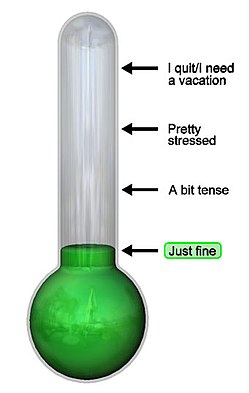User:Jumping cheese


| |||
| |||
| |||
| |||
| |||
| |||
| |||
| |||
| |||
| |||
| |||
| |||
| |||
 |
Jump The Cheese!!!
[edit]I first stumbled across Wikipedia sometime in 2004, but neglected to create an account until December 11, 2005. I became actively involved in Wikipedia at around January 2006.
I spend most of my free time on Wikipedia expanding articles, reverting various vandalism, adding pics, and other random stuffs. I hate disruptive users.
Behind the name
[edit]I chose the username "Jumping cheese" because I'm a high jumper and I hate cheese. Seriously. The "cheese" is lowercased because I accidentally forgot to capitalize it when I created my account. I only noticed my mistake after I made like ten edits, so I didn't want to create a new account and lose those edits. As I later found out, "Jumping cheese" (also known as "Casu marzu") is actually a real type of Italian cheese with larvae that jump on your face when you try to eat the cheese, hence for the recommendation to wear eye protecting (cheese fly larvae squirming in your eyes can't be good).
Here are some nicknames other Wikipedians have given me:
- JC
- J Cheese
- Cheese
- Mr. Cheese
- Cheesy
- Jumping
If you are really really bored, you can take a look at how my signature has changed over time. Enjoy!
 My Wikipedia Pals!
My Wikipedia Pals!
[edit]Pages I've Started
[edit]- Disney's Kim Possible 3: Team Possible
(promoted to B-Class singlehandedly by TuxedAaron)
- Neal Gabler
- Ronnie Day
- Sean McNamara
- Race to Space
- The Cutting Edge: Going for the Gold
- Ella Enchanted (film)
- Canadians of Taiwanese descent
- Disney's Kim Possible: Kimmunicator
- Disney's Kim Possible 2: Drakken's Demise
- Disney's Kim Possible: Revenge of Monkey Fist
- Disney's Kim Possible: What's the Switch?
- Disney's Kim Possible: Global Gemini
- Christy Carlson Romano: Greatest Disney TV & Film Hits
- Steve Loter
- In the Red
- Everything
- John Leo
- Justina Headley
- Tommy O'Haver
- Dermatopathia pigmentosa reticularis
- Puente Hills Landfill
- Everglades virus
 My Pages
My Pages
[edit]- User:Jumping cheese/Signature
- User:Jumping cheese/Busy
- User:Jumping cheese/nav
- User:Jumping cheese/Talkarchive
- User:Jumping cheese/Archive
- User:Jumping cheese/Title
- User:Jumping cheese/talk
- User:Jumping cheese/Sandbox
- User:Jumping cheese/monobook.js
- User:Jumping cheese/monobook.css
- User talk:Jumping cheese/Archive 1
- User talk:Jumping cheese/Archive 2
- User talk:Jumping cheese/Archive 3
- User talk:Jumping cheese/Archive 4
- User talk:Jumping cheese/Archive 5
- User talk:Jumping cheese/Archive 6
Random stuff about Wikipedia
[edit]- Ignore all rules
- A spade is a
- Don't call the kettle black
- Drop the stick and back slowly away from the horse carcass
- Stress alerts
- Paris is in France
- Wikipedians with articles
- Wikipedia Facebook
- List of non-admins with high edit counts
- Missing Wikipedians
- Deceased Wikipedians
- Warning to vandals: You can get sued for vandalizing...
- Spam fighting!
 Wikisuicide
Wikisuicide
Today's featured article |
|---|
 Magic tablet from Pergamon The Orphic Hymns are a collection of 87 hymns in ancient Greek, addressed to various deities. Attributed in antiquity to the mythical poet Orpheus, they were composed in Asia Minor (in modern-day Turkey), most likely around the 2nd or 3rd centuries AD, and seem to have belonged to a cult community which used them in ritual. The collection is preceded by a proem (or prologue) in which Orpheus addresses the legendary poet Musaeus. The hymns in the collection, all of which are brief, typically call for the attention of the deity they address, describing them and their divinity, and appealing to them with a request. The first codex containing the Orphic Hymns to reach Western Europe arrived in Italy in the first half of the 15th century, and in 1500 the first printed edition of the Hymns was published in Florence. During the Renaissance, some scholars believed that the hymns were a genuine work of Orpheus; later, a more sceptical wave of scholarship argued for a dating in late antiquity. (Full article...)
Recently featured:
|
It only takes two easy steps
First search for the article
If no article exist, create a new page
| 24 June 2025 |
|
| Wiktionary Dictionary and thesaurus |
Wikinews Free-content news |
Wikiquote Collection of quotations | |||
| Wikibooks Free textbooks and manuals |
Wikispecies Directory of species |
Wikisource Free-content library | |||
| Wikiversity Free learning materials and activities |
Commons Shared media repository |
Meta-Wiki Wikimedia project coordination |
is a SHA-512 commitment to this user's real-life identity.
| This is a Wikipedia user page. This is not an encyclopedia article or the talk page for an encyclopedia article. If you find this page on any site other than Wikipedia, you are viewing a mirror site. Be aware that the page may be outdated and that the user whom this page is about may have no personal affiliation with any site other than Wikipedia. The original page is located at https://en.wikipedia.org/wiki/User:Jumping_cheese. |  |
- WikiProject Film participants
- WikiProject Video games participants
- Wikipedians interested in video games
- WikiProject United States participants
- Wikipedians interested in the United States
- Wikipedians who use Mozilla Firefox
- Wikipedia rollbackers
- American Wikipedians
- Wikipedian runners
- Wikipedians who like South Park












